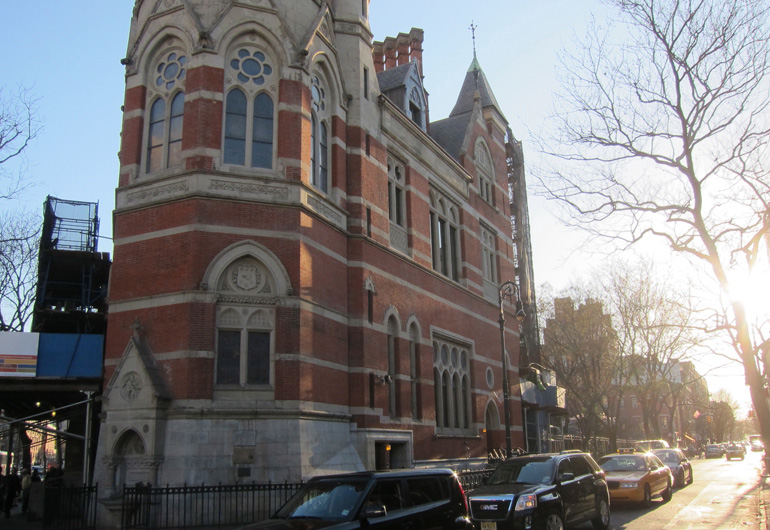Beachcombing:
Then read some more.
March 2012
Saturday, March 31st, 2012
¶ Here’s a fascinating little video about robots that reminds us how important it is to sit down and think through the problem of jobs for people. These little Kiva fellows are doing work that no human being ought to be asked to do for an extended period, much less a career, so they’re not the problem. Ask yourself: why is there no national chain, no McDonald’s, of dry cleaners? What can we learn from that? (kottke.org; 3/29)
¶ Tony Judt’s widow, Jennifer Homans, writes that “ideas were a kind of emotion” for her husband, and what better evidence of this could we have than his determination to continue working through the ravages of ALS. This is what enabled Judt’s humanism to prevail over his intellectuality. (NYRB; 3/5) ¶ Kevin Hartnett is inspired by Chimamanda Ngozi Adichie’s thoughts about colonialism and the “single story” to translate the concept to family dynamics. (The Millions; 3/8)
All parents tell single stories about their kids and all kids wish they didn’t. Single stories are the principle reason that, eventually, kids become so eager to leave home — they want to escape the simple narratives told about them since they were born, to jar their parents into recognizing that they’re no longer (and maybe never were) the person they were made out to be when they were eight years old.
¶ Richard Wolin visits China and delivers lectures on the impact of the Cultural Revolution upon French intellectuals. Quite aside from negotiating the tricky political implications of his scholarship, Wolin is disappointed by mindless modernizing. “I traveled to China in search of otherness and cultural difference, only to discover how homogenous and uniform the world has become.” (LARB; via 3 Quarks Daily; 3/16) ¶ Benjaming Fong, a scholar at Columbia, argues that the only way to keep the world from degenerating into Hannah Arendt’s “heap of things” is to conduct the Freudian psychoanalytic conversation. (NYT; via 3 Quarks Daily; 3/20) ¶ At The Crux, Julie Sedivy reports on the work of linguist William Labov, which suggests an interesting link between regional pronunciation and political alignment in the “Inland North.” (3/28) ¶ John Lanchester, I’ll bet, never expected to become the financial expert that he has become. He wouldn’t be so fresh if he did. What Marx got right and wrong, at 193. (LRB; via The Awl; 3/29)
¶ Benjamin Wallace considers TED, noting that the conferences founder, Richard Saul Wurman, plans new conferences in the original TED’s spirit, less packaged and high-minded than Chris Anderson’s curation. We think that Wurman is on the right traack: the only guests will be the speakers. (New York; via MetaFilter; 3/1) Wallace writes,
Until recently, the universal self-Âactualizing creative ambition was to write a novel. Everyone has a novel in them, it was said. Now the fantasy has changed: Everyone has a TED Talk in them.
¶ Jonah Lehrer explains why the brain’s capacity for the subconscious parallel processing of massive amounts of data makes our emotions more reliable than our reasoned recollections. (Frontal Cortex; 3/2) ¶ Tim Requarth and Meehan Crist, however, argue that Mr Lehrer has gone too far in the claims about “creativity” (which, we agree, is an awfully nebulous portmanteau) in Imagine. (The Millions; 3/27) ¶ Laura McKenna casts a gimlet eye upon the Pinterest phenomenon. “We may never make that bucolic scene a reality, but in the meantime, Pinterest is making big money off letting adults play make-believe.” (GOOD; 3/5) ¶ Whatever you do, don’t go whining to Felix Salmon about the cost of living in New York City. It’s “the ultimate in parochialism.” (3/6) ¶ Speaking of reasons and emotions — well, you can’t, and Sam McNerny explains why (in case you hadn’t guessed) at Why We Reason (he’ll have to come up with a new title now!). “Reason” and “emotion” are ancient concepts, conceived in utter ignorance of neurology. But they’re hardily planted in our minds, and they’re proved to be helpful in explaining what neuroscientists are discovering about memory, decision-making, and so on. Now we’re on notice that, since neither reason nor emotion actually exists in the mind, the words are just as likely to skew our understanding. (via The Browser; 3/8) ¶ Alex Engebretson appreciates the thought of Marilynne Robinson, while noting that it takes no notice of intellectual trends emerging after her undergraduate days. Also:
She includes almost zero references to TV, movies, Facebook, celebs, or anything to do with pop culture. Her lonesome distance from the mainstream is eccentric, but it’s also what gives her essays their strange power to diagnose America’s discontents.
Indeed. (The Millions; 3/16) ¶ Flight simulator for the sociable soul: reading fiction really does exercise the brain, which, according to Annie Murphy Paul, “ does not make much of a distinction between reading about an experience and encountering it in real life; in each case, the same neurological regions are stimulated.” (NYT; 3/19)
¶ For those of you who persist in regarding Harvard as some kind of school, Yves Smith has a bridge for sale. (Naked Capitalism; 3/5) ¶ Worst US President ever? Just what we thought: Andrew Jackson. Akim Reinhardt has good reason to leave a trail of tears. (3 Quarks Daily; 3/12) ¶ Felix Salmon makes us wonder: does the term “banking client” make sense? How did it come about that everyone expected banks to act altruistically? On the other hand, perhaps they ought to. (3/16) ¶ How do you feel about Mike Daisey “improving” a few anecdotes for his powerful, anti-Apple theatre piece, The Agony and the Ecstasy of Steve Jobs? Some people, it appears, believe that Daisey is to be saddled with the responsibilities of a journalist. We should have thought that it was enough that his monologue inspire real journalists to go after the story. We’re afraid, then, that Jen Paton seems to us to be confused. (3 Quarks Daily; 3/19) ¶ Ian McEwan writes (or speaks) with characteristic fluency about the drive to be first, experienced (to their surprise) by both Darwin and Einstein; and about the elegance exhibited by novel theories that find rapid acceptance. In short: the art of science. (Guardian; via Cosmic Variance; 3/27) ¶ Mark O’Connell thinks out loud about John D’Agata, Mike Daisey, and even Kony 2012, all in one go. “The poetry of fact is inevitably less poetic when the facts turn out to be counterfeit.” Hear, hear. (The Millions) ¶ And, while we’re on the subject of Mike Daisy, let’s hear from Maria Bustillos — who, having worked there, actually knows something about China — with an update on “orientalism.” (The Awl; 3/29)Â
¶ Rohan Maitzen proposes a return to the free and impressionistic criticism exemplified by the two series of Common Reader pieces written by the very uncommon Virginia Woolf. (Open Letters Monthly; via 3 Quarks Daily) ¶ Also arguing that we need to re-establish a common language that explains the world to non-specialists, Carl Zimmer proposes Alan Alda’s Flame Challenge. (The Loom; 3/5) ¶ Never mind bad books; Tim Parks wonders if it’s really necessary to finish reading the good ones. (NYRBlog) ¶ Everyone wants to beat up on Jonathan Franzen, most recently for writing that Edith Wharton wasn’t pretty, and have to agree that he brings this hostility upon himself. We should have said that what made Edith Wharton unattractive was her impatient intelligence, which was a great deal less becoming in constrained Old New York (which she quitted) than any degree of plainness. In any case, we’re glad that Laura Miller sees Franzen’s point. (Salon; 3/16) ¶ Notes on Edith Wharton br Francine Prose, who is unblinking but also unjudging about Wharton’s casual, cringe-making anti-semitism. (NYRBlog; 3/22) ¶ Cory MacLauchlin is tantalized by the possibility of palpating the manuscript of John Kennedy Toole’s A Confederacy of Dunces. No such luck, but a warm reminder of what is still a prime example of the posthumous hit. (The Millions; 3/26) ¶ Michael Hingston writes admiringly of Lysley Tenorio’s linked story collection, Monstress. (The Rumpus) ¶ Michelle Dean wishes that she’d been there when Wallace Stevens took a swing at Ernest Hemingway — and broke his hand. (The Rumpus; 3/27)
¶ Nicole Cliffe captures the great fun of having read The Secret History, which certainly would have inspired us to major in Classics, had we been younger. Also: why nobody will ever make a successful film adaptation. And don’t skip the discussion questions. By the way, Nicole, The Little Friend is pretty good, too; it’s sort of Harper Lee’s second novel. (The Awl; 3/22) ¶ Susan Orlean @ Days of Yore: “Write, write, write, and then read. Then read some more. Then sit down and write some more. (3/27) ¶ We have no idea what makes this timely, but Karen Cook’s Village Voice appreciation of Louise Fitzhugh, the creatrix of Harriet the Spy, is clearly General Delivery. (via MetaFilter; 3/29)
¶ Whit Stillman has a new film coming out next months, his first since the Nineties. To prepare for Damsels in Distress, have a look at Lindsey Bahr’s review of Metropolitan, Barcelona, and The Last Days of Disco, at least two of which are concerned with such damsels. (Splitsider; 3/1) ¶ A profile of Whit Stillman, who “extols the overlooked merits of convention and the hidden virtues of the status quo.” As who wouldn’t, with such wicked stepmother issues. (NYT; 3/19) ¶ Even we were too young to watch Sid Caesar when he was new, and our appreciation of his artistry has nothing to do with nostalgia. Speaking of Artistry, nobody has mentioned the undoubtable influence of Caesar’s Aggravation Boulevard on the new Best Picture. (Splitsider; 3/2)
¶ Julia Felsenthal’s “curious history” of faux-traditional West African prints reminds us of globalization’s dense colonial roots. (Slate; via The Morning News; 3/5) ¶ Kyo Maclear visits The Monkey’s Paw used bookshop in Toronto, and realizes something that it’s easy to overlook in this networked world: the connection between a reader and a book is unique. No two people like a book in quite the same way. And every book is dead when it isn’t being read. (The Millions; 3/12) ¶ We’re all for livening up symphony orchestra concerts, but fisticuffs in the box seats is going too far! (Sun-Times; via Arts Journal; 3/16) ¶ How gurls talk! Mary HK Choi and Natasha Vargas-Cooper dish The Hunger Games. (The Awl; 3/26) ¶ JR Paris recalls a former friend who used to eat dinner seated in a chair at his open refrigerator while driving himself crazy reacting to radio news. That’s wilder than any of the Watergate characters he’s reading about in Thomas Mallon’s novel! (Mnémoglyphes; 3/27) ¶ Felix Salmon explains Damien Hirst (3/28):
Hirst, for better or worse, has moved himself out of the art market and into the consumption-goods market: he manufactures art works, sets the prices for them, and sells them to anybody willing to buy them. Once you have bought a Hirst, you then exhibit it as a way of displaying your wealth and, um, taste. Hirsts have not been a speculative investment since 2008, and I very much doubt the Tate retrospective is going to change that.
Have a Look: ¶ Maria Popova’s selection of vintage posters from 20th Century Travel. (Brain Pickings; 3/3) ¶ The new look at kottke.org, which reminds us of what we did almost two years ago. Except of course for the vastly superior tech. Where can we buy some of that? (3/5) ¶ Intersections in the Age of Driverless Cars. (@ kottke.org; 3/19) ¶ Melissa Broder’s Lit Scene Tarot. (HTMLGiant; 3/22) ¶ Clothes link the characters in the two tales of W./E. (Clothes on Film; 3/27)
Noted: ¶ Count Lustig’s Ten Commandments for Con Men. (Lists of Note; via kottke.org; 3/1) ¶ Hey girl. Ryan Gosling meme roundup @ MetaFilter. (3/2) ¶ Tyler Cowen is “pleased to have no middle initial.” ¶ The actual Irish speak up: “We don’t really like “Danny Boy.” (IrishTimes; via Real Clear World; 3/5) ¶ Next time you cut your finger, save a life. (GOOD) ¶ What happens to clothes that you donate. (GOOD; 3/8) ¶ Armistead Maupin looks back sweetly to the days of writing on carbon paper. (Guardian; via The Browser)  ¶ Jed Perl thinks not highly of Cindy Sherman. (New Republic; 3/16) ¶ Tyler Cowen is enjoying his advance copy of Sergio de la Pava’s A Naked Singularity. (3/19) ¶ Books Re-read by Helen DeWitt. ¶ 42 Common Kitchen Fails. (via The Morning News; 3/21) ¶ Vita Sackville-West @ HiLobrow (3/26) ¶ Tumblr: the public commonplace? (The Millions) ¶ The hygiene hypothesis regarding autoimmune diseases. (80beats; 3/27) ¶ “Fighting Polluters Pits Environmental Groups Against Each Other.” (GOOD; 3/28)

















